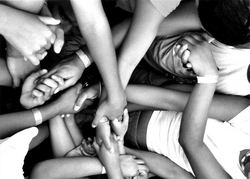 In our pursuit of personal growth and harmonious relationships, we often come across the words "nice" and "kind." At first glance, these terms may seem interchangeable, but upon closer examination, we discover a significant distinction between them. In this article, we will explore the profound difference between being nice and being kind, and how embracing kindness can transform our lives and the lives of those around us. Niceness: A Surface-Level Interaction Niceness is often associated with polite behaviour, superficial pleasantries, and a desire to avoid conflict at all costs. It involves being agreeable, compliant, and seeking approval from others. While niceness can create a pleasant atmosphere momentarily, it is a surface-level interaction that may lack authenticity and fail to address the deeper needs of individuals. Niceness can sometimes stem from fear—fear of rejection, judgment, or not meeting societal expectations. It can result in people-pleasing tendencies, where individuals compromise their own values and well-being to gain approval or avoid confrontation. While there is value in being polite and respectful, relying solely on niceness may prevent us from fostering genuine connections and making a meaningful impact. Kindness: A Compassionate Force for Change Kindness, on the other hand, emerges from a place of genuine care and empathy for others. It goes beyond superficial niceties and reaches into the depths of human connection. Kindness is an intentional act that seeks to alleviate suffering, bring joy, and support others in their journey. Unlike niceness, kindness is not conditional. It is not driven by the desire for recognition or reward but by a heartfelt desire to make a positive difference. Kindness requires active listening, understanding, and a willingness to step into someone else's shoes, even when it may be challenging. Benefits of Choosing Kindness Kindness fosters deeper, more meaningful connections with others. By genuinely caring and demonstrating empathy, we create an environment where people feel seen, heard, and valued. These authentic connections form the basis of strong relationships and a sense of community. Acts of kindness, both given and received, have a profound impact on our emotional well-being. Kindness releases endorphins, oxytocin, and serotonin—neurotransmitters associated with happiness, love, and overall well-being. It boosts our self-esteem, reduces stress, and enhances our overall mental health. Kindness is contagious. When we extend kindness to others, it inspires them to pay it forward, creating a ripple effect of positivity. Small acts of kindness can have far-reaching consequences, transforming communities and making the world a better place. Choosing kindness cultivates compassion, empathy, and gratitude within ourselves. It encourages us to step outside our comfort zones and consider the needs of others. By continually practicing kindness, we expand our own capacity for love, understanding, and personal growth. While being nice has its merits in certain situations, it is essential to recognize the inherent power of kindness. Kindness requires us to transcend superficial interactions and embrace genuine care and empathy for others. By choosing kindness, we create deeper connections, promote emotional well-being, initiate a ripple effect of positivity, and experience personal growth. Let us embrace the transformative potential of kindness and cultivate a world where compassion, understanding, and genuine acts of goodness are not only valued but celebrated. Together, we can make a difference, one act of kindness at a time.
0 Comments
29/5/2015 0 Comments The ties that bind me to my sisters are not wrapped around my wrists, but rather are fastened to my heart. Life is an opportunity, benefit from it. Life is beauty, admire it. Life is a dream, realize it. Life is a challenge, meet it. Life is a duty, complete it. Life is a game, play it. Life is a promise, fulfil it. Life is sorrow, overcome it. Life is a song, sing it. Life is a struggle, accept it. Life is a tragedy, confront it. Life is an adventure, dare it. Life is luck, make it. Life is too precious, do not destroy it. Life is life, fight for it. - Mother Teresa 31/10/2013 0 Comments Find your inner strength"In the midst of winter, I found there was, within me, an invincible summer. And that makes me happy. For it says that no matter how hard the world pushes against me, within me, there’s something stronger – something better, pushing right back." - Camus
Everywhere you go, people talk about how to get fit and how to make your body stronger. Something we should consider as well is how to make our inner selves stronger. Just as we can work on developing our physical strength by eating healthy foods and doing exercise, it’s equally important that we develop our inner strength. The only way to make it through the twists and turns that life can throw at you is to have inside of you a well of strength to draw upon. Here are some ideas of ways to help you build your inner strength. 1. Have a supportive community and find your tribe. The most basic and instinctive need as humans is our need to belong and be connected to a tribe or a community. It’s one of the first levels on Maslow’s Hierarchy, a psychology theory that organizes our basic needs in our personal development. We might want to go it alone, but that can make life really difficult. As humans, we have a built-in desire to belong. You can find community nearly everywhere, whether that is your sorority sisters, your close group of girlfriends, your family, at your gym, church or work. You can even find communities with your interests on Facebook, on forums and on sites like Meetup.com. Having a community to fall back on is the equivalent of having a back up net to catch you should you fall. 2. Practice saying “No” and pick your battles wisely. It can be very easy to take on extra commitments and obligations even when we don’t want to or don't have time. Sometimes we just can't help but say, "Yes, I'll do it." When we take on responsibilities that we don’t have the time or energy to commit to, it can drain our reserves and make it difficult to take care of ourselves. Saying “yes” to running the fundraiser at your child's school, or picking up an acquaintance at the airport when you really don’t have the time, is like purposely poking a hole in your tank and allowing your energy to leak out. Not only does saying “no” free up time for yourself, it can be very empowering, and an unlikely source of strength. Pick and choose what things you want to do, and balance them with the things you must do. By saying no to the things you really don’t want to do, you create a sense of inner strength while freeing up your time and energy to do the things that are going to serve you best. 3. Be thankful. Life can suck, but if you look around you, you'll find any number of things to be grateful for. The joy you derive from the world around you is the fuel that'll push you through the hardest of times, so pay attention to what you have and enjoy it for what it's worth. And when you're having a hard time seeing just what it is you can be thankful for, your tribe can help you take a closer look at the things around you. And if you're still having trouble, try giving back to your community. At least that way someone else will have something to be thankful for - you. 4. Remember that nothing is permanent. If you’re in the middle of a period of grief or pain that you can’t control, stand aside and let the moment happen. If you are going through a prolonged period of difficulty, remind yourself that this, too, shall pass. But there is also no shame is asking for help if you need it. And we all need it sometimes. If you work on your inner strength you will be able, with the help of your friends, to overcome anything life throws at you. 26/9/2013 1 Comment Are you nice or are you kind? In our pursuit of personal growth and harmonious relationships, we often come across the words "nice" and "kind." At first glance, these terms may seem interchangeable, but upon closer examination, we discover a significant distinction between them. In this article, we will explore the profound difference between being nice and being kind, and how embracing kindness can transform our lives and the lives of those around us. Niceness: A Surface-Level Interaction Niceness is often associated with polite behaviour, superficial pleasantries, and a desire to avoid conflict at all costs. It involves being agreeable, compliant, and seeking approval from others. While niceness can create a pleasant atmosphere momentarily, it is a surface-level interaction that may lack authenticity and fail to address the deeper needs of individuals. Niceness can sometimes stem from fear—fear of rejection, judgment, or not meeting societal expectations. It can result in people-pleasing tendencies, where individuals compromise their own values and well-being to gain approval or avoid confrontation. While there is value in being polite and respectful, relying solely on niceness may prevent us from fostering genuine connections and making a meaningful impact. Kindness: A Compassionate Force for Change Kindness, on the other hand, emerges from a place of genuine care and empathy for others. It goes beyond superficial niceties and reaches into the depths of human connection. Kindness is an intentional act that seeks to alleviate suffering, bring joy, and support others in their journey. Unlike niceness, kindness is not conditional. It is not driven by the desire for recognition or reward but by a heartfelt desire to make a positive difference. Kindness requires active listening, understanding, and a willingness to step into someone else's shoes, even when it may be challenging. Benefits of Choosing Kindness Kindness fosters deeper, more meaningful connections with others. By genuinely caring and demonstrating empathy, we create an environment where people feel seen, heard, and valued. These authentic connections form the basis of strong relationships and a sense of community. Acts of kindness, both given and received, have a profound impact on our emotional well-being. Kindness releases endorphins, oxytocin, and serotonin—neurotransmitters associated with happiness, love, and overall well-being. It boosts our self-esteem, reduces stress, and enhances our overall mental health. Kindness is contagious. When we extend kindness to others, it inspires them to pay it forward, creating a ripple effect of positivity. Small acts of kindness can have far-reaching consequences, transforming communities and making the world a better place. Choosing kindness cultivates compassion, empathy, and gratitude within ourselves. It encourages us to step outside our comfort zones and consider the needs of others. By continually practicing kindness, we expand our own capacity for love, understanding, and personal growth. While being nice has its merits in certain situations, it is essential to recognize the inherent power of kindness. Kindness requires us to transcend superficial interactions and embrace genuine care and empathy for others. By choosing kindness, we create deeper connections, promote emotional well-being, initiate a ripple effect of positivity, and experience personal growth. Let us embrace the transformative potential of kindness and cultivate a world where compassion, understanding, and genuine acts of goodness are not only valued but celebrated. Together, we can make a difference, one act of kindness at a time. |
|
|
We acknowledge the Wurundjeri Woi Wurrung People of the Kulin Nation, who are the Traditional Owners of the land on which our organisation was founded, and pay our respect to their Elders past, present and emerging. We pay our respect to the traditional owners of the lands on which we meet all around the world.
Delta Kappa Nu Sorority, Inc. is welcoming to everyone who would like to be a sister, not just cis-ters.
|

 RSS Feed
RSS Feed

